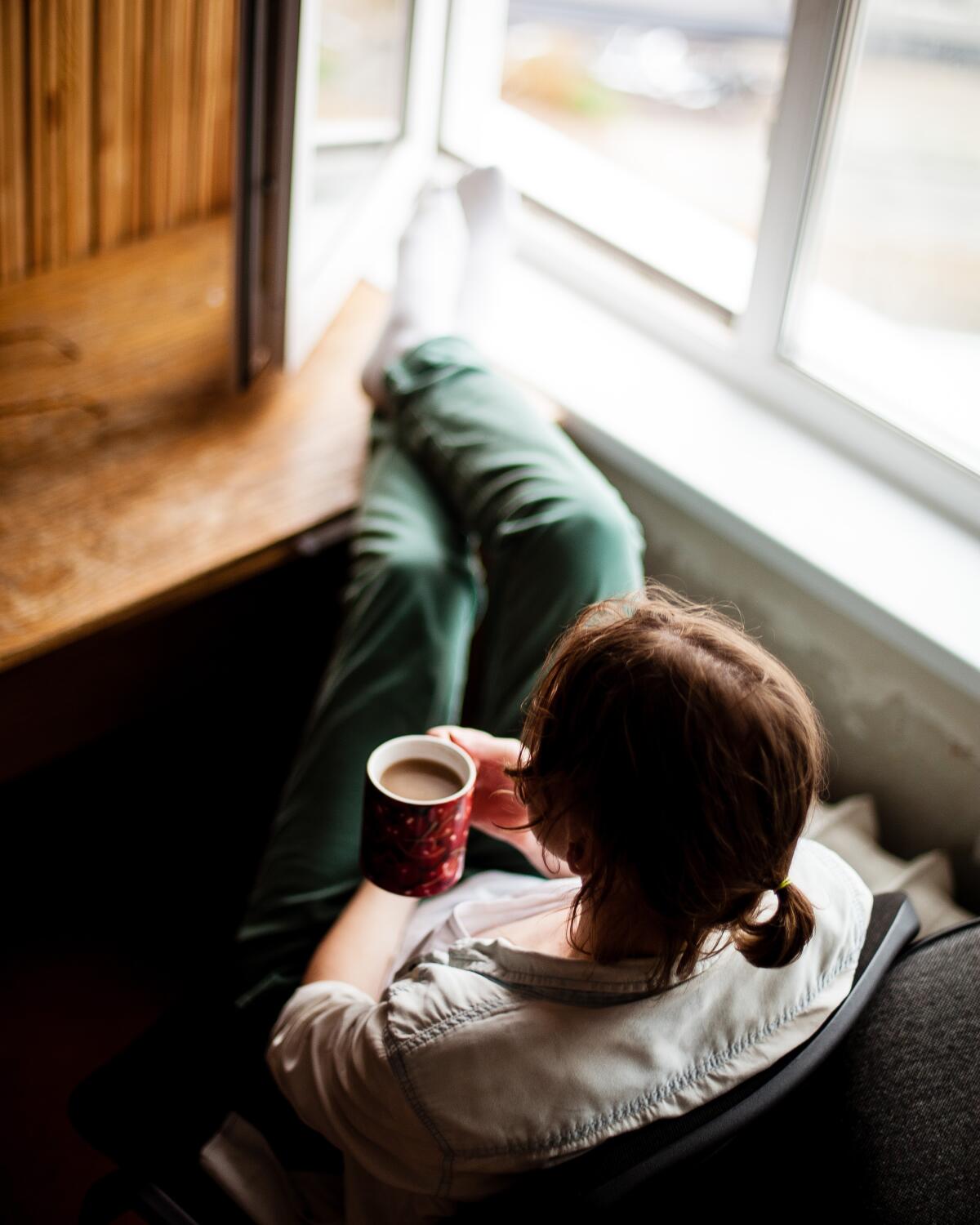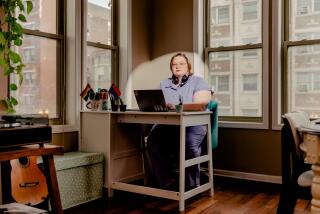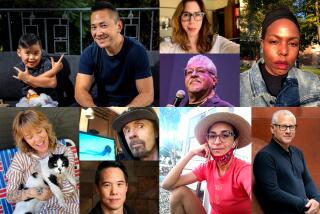What to do during your coronavirus home quarantine? How about: Nothing

- Share via
Now that we’re all cooped up, what are we supposed to do with this abundance of undifferentiated free time? For the moment, I’m telling myself to do nothing.
The old me would have ambitiously drawn up plans. Finally, time to continue writing that book, redraft that play and start a new short story.
My mental whip is always cracking. Take out those French and Italian workbooks, I exhort myself during the summer when the theater calendar eases. Recently, I’ve been toying with the idea of taking an online math class to see if this aging brain is still capable of grappling with complex equations.
Even with my theater assignments and teaching, I’m always setting epic reading challenges. A couple of summers ago, I reread Shakespeare’s plays. The year before that, I reread (in a new translation series) Proust’s interminable and irreplaceable novel.
I’m sure I’m not the only writer who fantasizes about retreating to a country house with nothing to do but curl up by a fire beside a mountain of Dickens and Dostoevsky. But as the coronavirus pandemic upends our civilization, I’m urging myself to jump off the self-improvement treadmill.
We’re still wrapping our mind around this crisis, grasping the dimensions and speculating about the time lines. Can this massive societal interruption really be happening? In a technological age that has given us a false sense of control over reality, the events of the last week defy comprehension. The shock is part of the problem.
Ready to watch that Pulitzer-winning play you meant to catch years ago? Want to time-travel to see Angela Lansbury do “Sweeney Todd” in 1982? Here’s how.
Back when I was a full-time professor, I used to teach a seminar on Greek tragedy. Each year I would begin the course the same way: “No matter how advanced our society becomes, no matter the scientific breakthroughs, the wisdom found in the drama of 5th BC Athens will never be obsolete.”
Human nature, for all its marvels, remains a paradox. As Freud maps out in his brooding monograph “Civilizations and Its Discontents,” human suffering springs from three sources: “the superior power of nature, the feebleness of our own bodies,” and if I may paraphrase, the inherent contradictions in being a social animal.
Humanity has evolved in many ways, but modernity has fostered an illusion that the Greek tragedians were routinely dismantling — the idea that man is the measure of all things. Art is meant to disabuse of such childish delusions and reconnect us to ultimate truth.
Henry James, writing on the modern tragedian Henrik Ibsen, observes that the great Norwegian playwright transcends his limitations by showing us “the individual caught in the fact.” Tantalized by this classic Jamesian obfuscation, I asked the professor who introduced this essay to me to share his understanding of the word “fact.” “Mortality, futility,” he succinctly replied after reflecting on the existential implications.
Nature, catching human beings in the fact of biology, has hit the pause button, suspending the normal order of operations. We can’t distract ourselves out of this emergency. Rather than cram myself with books, movies and TV shows while under self-imposed house arrest, I’m prepared to settle into the boredom to see what illumination I might find there.
No, I’m not planning to turn my apartment into a monastery. I simply want to give myself a break from the frenzy of mass cultural consumption — the binge mentality that doesn’t pertain only to streaming television. For the last few years, I’ve been keeping a tally of my reading. This year I could easily set a record, but I think the time would be more profitably spent if I reevaluate why I read.
The pace of living has accelerated to such an extent that our inner lives have been in danger of being canceled. Productivity has overrun purpose. Earlier this month I received the first speeding ticket of my life. Where was I going 45 mph in a 35-mph zone? To a lunch-hour yoga class.
Rushing in my usual way, I wasn’t aware I was going over the speed limit. Like many people, I move through my day with no breath to spare, intolerant of any hiccup that might upset the itinerary. Even a phone call can feel like an intrusion. How dare this person presume I’m free when I’m sling-shotting to the vinyasa studio between deadlines.
Since social distancing has been put into effect, the sound of the phone has become a comfort. How have I failed to recognize for so long that the friend or family member calling me was throwing out a mutual rope? The profession of criticism might attract solitaries and curmudgeons, but art is nothing if it is not a bridge to other people.
Coronavirus canceled individual productions or entire seasons (not to mention all of Broadway). Here’s how some are reopening on a digital stage.
Rather than cram myself with books, movies and TV shows while under self-imposed house arrest, I’m prepared to settle into the boredom to see what illumination I might find there.
Somewhere along Silicon Valley’s march to world domination, this basic truth has been lost. Our social media bubbles encourage acquisitiveness. We go to museums to take selfies. We post theater programs on our Facebook pages to remind ourselves that we are indeed living an enviable life. The audience for these self-advertisements is little more than an idea inside our lonely heads.
Gorging all day on the news that streams off our phones, we are almost surprised to discover that holding this channel of information in our hands doesn’t give us any power over it. If recent politics hasn’t taught us the impotency of our tweets, this coronavirus nightmare should convince us once and for all.
Blazing about the internet these days is a maxim by Blaise Pascal: “All of humanity’s problems stem from man’s inability to sit quietly in a room alone.” The French mathematician and philosopher understood that how we conduct our solitude determines how we come together as a society.
Creativity depends on stillness. Borrowing from the teaching wisdom of María Irene Fornés, I advise my playwriting students at the California Institute of the Arts when they encounter a roadblock in their writing not to force an answer but to wait and be receptive to what they cannot yet see.
As Portia in “The Merchant of Venice” says, “It is a good divine that follows his own instructions; I can easier teach 20 what were good to be done, than be one of the 20 to follow my own teaching.” But with this unasked for luxury of inactivity, I have an opportunity to discover what unforeseen possibilities might arise from being “unproductive” with my spare time.
To cope with the dire news, I’ve been slowly reading Jenny Offill’s new novel, “Weather.” I read her previous book “Dept. of Speculation” on a plane from JFK to LAX. I could have also gobbled “Weather” in a single sitting. But rather than notch another victory in my reading journal, I’m taking my time to savor the style of an original talent.
I’ll admit I’m eyeing Leo Tolstoy’s “Anna Karenina” and Thomas Mann’s “The Magic Mountain,” both of which I’ve been longing to reread. But as the world spirals from this deadly pandemic, I’m filled with too much belated gratitude for the fragile moment to hurry up.
More to Read
The biggest entertainment stories
Get our big stories about Hollywood, film, television, music, arts, culture and more right in your inbox as soon as they publish.
You may occasionally receive promotional content from the Los Angeles Times.











